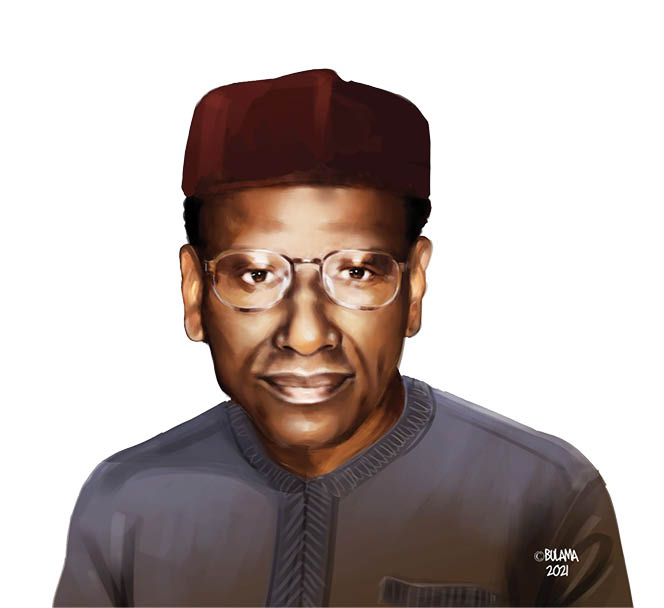Malam Mamman Daura, President Muhammadu Buhari’s nephew, has narrated how ex-President Olusegun Obasanjo cut short the tenure of the late Dr Mahmud Tukur as Vice-Chancellor of the Bayero University, Kano (BUK).
Obasanjo served as Head of State between 1976 and 1979, and was elected president in 1999, leaving office in 2007, after serving two terms.
Tukur, who died on April 9, 2021, goes into history as the first Vice-Chancellor of BUK.
Daily Trust had reported how close Daura and Tukur were until the moment the former VC died.
In a tribute to his late friend, Daura described how Tukur rejected the appointment as Vice-Chancellor of the University of Lagos and resigned as BUK VC.
“Dr Mahmud Tukur who died recently in Abuja held many prominent offices of state but no post defined him like his spirit of nationalism and patriotism. In his adult life, he was Principal Secretary Northern Nigeria Civil Service; Principal of the Institute of Administration, Kongo, Zaria; an affiliate College of Ahmadu Bello University, Zaria; Principal and later Vice Chancellor of Bayero University Kano and although appointed Vice-Chancellor, University of Lagos, he refused to accept the post on account of impropriety and violation of the rules. He was also Minister of Commerce and Industry in General Buhari’s Government of 1984-85.
“Alas his tenure in BUK was cut short as a result of a bizarre decision by General Obasanjo, who abruptly posted Mahmud Tukur as Vice-Chancellor of Lagos University and Professor Akinkugbe to ABU. Mahmud refused and resigned his offices.
“This abrupt end did not result in complete distance from the Academia. Mahmud set to work and adapt his Doctoral thesis to write his stupendous “Leadership and Governance in Nigeria: the relevance of values.” It was a major work of scholarship and understanding,” he wrote.
Daura also commented on how he met his late friend and how they kept in touch for 60 years.
“I first set eyes on Mahmud Tukur in August 1958 when a group of us were assembled in Kano to be flown to the UK for further studies. The Sardauna, Premier of the North (may ALLAH rest his soul) personally selected six boys, all top of their class in their respective secondary schools: Mahmud Tukur, Tiamiyu Salami, Abubakar Alhaji, Augustine Yange (now Abdullahi Yange), Shehu Ibrahim and myself were told to drop whatever we were doing and prepare to go to England.
“We were taken to London, thence to Bournemouth and placed in Bournemouth Municipal College. The Sardauna’s instruction was that we were to be given a “liberal education”. The subjects in the curricula were: History, Geography, English Literature, Latin, Logic and Mathematics. We enjoyed our studies although Mahmud complained that Logic was jolly uninteresting. He and I shared rooms in our digs and have been sharing views, advocating causes and defending interests ever since.
‘Tukur was a brilliant student’
“In quick succession, Mahmud passed his O and A levels and was admitted to Aberystwyth campus, University of Wales, where Prince Charles, the eldest son of the Queen of England also studied. He came out top of the class there too being awarded the Elizabeth Morris memorial prize. He graduated with Honours Degree in International Relations. His tutor, the distinguished academician, Professor P. A. Reynolds held Mahmud in such high regard that on occasions he would ask Mahmud to review a new book and would present it for publication under his name. No higher praise from a teacher to a student.
“His academic performances were outstanding, proceeding to the University of Pittsburgh, US and to North Western University to do a Master’s Degree in International Relations. There he was with an old friend, Professor John Paden, author of books on Nigeria including biographies of Ahmadu Bello (1976) and Muhammad Buhari (2015).
“On returning home from America, he joined the Northern Nigeria Civil Service with stints in the Premiers Office as District Officer (D.O.) in Niger Province and at the newly created Ministry of Water Resources. He learnt the rudiments of government under great civil servants like Ali Akilu, Liman Ciroma and Sunday Awoniyi.”

 Join Daily Trust WhatsApp Community For Quick Access To News and Happenings Around You.
Join Daily Trust WhatsApp Community For Quick Access To News and Happenings Around You.


